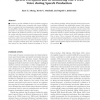Free Online Productivity Tools
i2Speak
i2Symbol
i2OCR
iTex2Img
iWeb2Print
iWeb2Shot
i2Type
iPdf2Split
iPdf2Merge
i2Bopomofo
i2Arabic
i2Style
i2Image
i2PDF
iLatex2Rtf
Sci2ools
JOCN
2010
2010
Functional Overlap between Regions Involved in Speech Perception and in Monitoring One's Own Voice during Speech Production
The fluency and the reliability of speech production suggest a mechanism that links motor commands and sensory feedback. Here, we examined the neural organization supporting such links by using fMRI to identify regions in which activity during speech production is modulated according to whether auditory feedback matches the predicted outcome or not and by examining the overlap with the network recruited during passive listening to speech sounds. We used real-time signal processing to compare brain activity when participants whispered a consonant
| Added | 19 May 2011 |
| Updated | 19 May 2011 |
| Type | Journal |
| Year | 2010 |
| Where | JOCN |
| Authors | Zane Z. Zheng, Kevin G. Munhall, Ingrid S. Johnsrude |
Comments (0)

